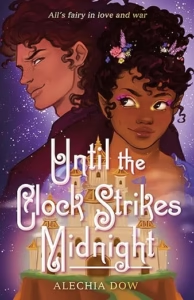Until the Clock Strikes Midnight
Alechia Dow
Feiwel & Friends
Published February 3, 2026
Amazon | Bookshop | Goodreads
About Until the Clock Strikes Midnight
The Good Place meets the Brandy version of Cinderella in Until the Clock Strikes Midnight, a cozy, romantic fantasy from award-winning author Alechia Dow.
Darling is the most talented—and unusual—Guardian to get a chance at winning the coveted once-in-a-generation Mortal Outcome Council mentorship. Getting the spot would mean having the opportunity to shape the future happiness of all mortal realms—if she succeeds at her first assignment, Lucy Addlesberg. Darling thinks it’ll be an easy razzle-dazzle job… until she actually meets Lucy. Her life is a complete mess, from her failing bookshop in her downtrodden village to her doomed flirtation with the princess of Lumina. But if there’s one thing Darling’s good at, it’s a makeover.
Calamity is the most talented—and arrogant—Misfortune of his class. It’s his job to save mortals from their own terrible decisions made in the pursuit of the mythical “Happily Ever After.” When Calam is granted a shot at the Mortal Outcome Council mentorship, he thinks his dreams are finally coming true. But first, he must pass the test. It should be easy—Lucy Addlesberg has been unfortunate for years. All he has to do is continue her string of bad luck so she can finally come to terms with reality and settle for a safer, more logical path in life. Yet when he arrives, he finds that Lucy has a Guardian assigned to her too—a chipper overachiever who is as colorful as the magic pouring from her glittery wand.
To thwart each other, Darling and Calam insert themselves into Lucy’s life posing as a betrothed couple. As they try to guide her down what they each see as the best path for her, they start questioning their roles and ultimately what they truly want for themselves… and if those feelings of loathing they have for each other might actually be something more like love.
My Review
Darling had me on page one. I found her so relatable and her perspective so much fun to read. The story is predominantly set in a bookshop – another win, as far as I’m concerned! I also enjoyed the chemistry between Darling and Calamity. It felt present without dominating the story. I liked watching them figure one another out. I loved how they both fell in love with the town and the bookstore.
Darling takes medication to manage her bipolar disorder. She is very aware of how missing her pill impacts her health. The author could have created a more magical treatment for Darling, but I actually really appreciate that she presented a daily pill right in the midst of this whimsical, magical story. It was like a quiet statement that taking medication doesn’t inhibit the magic. It was also a reminder to readers that taking medication doesn’t make someone deficient in some way. Even a fairy needs to take medicine to support her health.
I liked the pace of the romance in the book. I especially like the balance between Darling and Calamity’s developing feelings and Lucy and her love interest’s romantic arc.
If you’re looking for a mental health-positive fantasy packed with whimsy and drizzled with romance, definitely check this one out. I’ve enjoyed all of Dow’s books, so I’ll take this moment to say that if your taste runs more toward sci-fi than fantasy, be sure to check out her earlier books: The Sound of Stars, The Kindred, and A Song of Salvation.
Content Notes
Recommended for Ages 14 up.
Profanity/Crude Language Content
Very infrequent use of profanity.
Romance/Sexual Content
Kissing. Reference to sex.
Spiritual Content
Darling and Calamity have the ability to do some magic. Fairies and other magical beings exist in this story world.
Violent Content
A few characters bully and/or try to manipulate others.
Drug Content
None.
Note: This post contains affiliate links, which do not cost you anything to use but help support this blog. I received a free copy of this book in exchange for my honest review. All opinions are my own.
